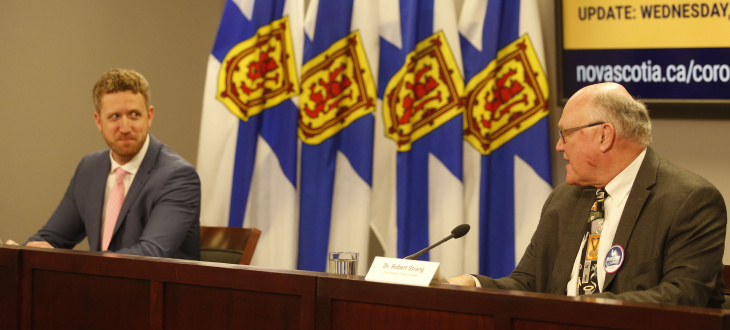On February 6th, the Liberal Party of Nova Scotia chose a new leader - the second youngest premier in our political history. Second to Rodney MacDonald.
The 37-year-old former minister of the environment won on a second ballot, beating out Halifax MLA and Labour Minister Labi Kousoulis and former Health Minister Randy Delorey.
In the weeks since the new premier officially took office, he has become intimately familiar with our mounting deficit, the intricacies of a daunting global pandemic, and the many moving parts associated with a vaccine rollout. In short, Premier Rankin hit the ground running at top speed, tasked with leading us out of this dark period. A job not for the faint of heart.
In his acceptance speech, Premier Rankin stated, “Whether you’re a union member or a business owner, whether you live in downtown Halifax or in a rural community, whether you work in an office or on the land or on the sea, or you are a student or are retired, I’ll be calling on your skills, your experience and your expertise to guide our decisions.”
He had more to say about unions since taking the reins. In an interview with CBC’s Information Morning on February 24th, radio host Portia Clark asked Premier Rankin about his approach to building bridges with public-sector unions. Saying, everyone has a role to play, the premier noted that unions have contributed to our way of life and workplace safety. He also said he respected the work unions do and that having dialogue with unions is important.
He anticipates there will be times we’ll disagree on compensation increases (his words), something he called a point of contention in the past, but that he hopes unions and government can come together.
In keeping with one of his major campaign themes, the premier developed an Office of Mental Health and Addictions. Beyond that, little else has been said about healthcare priorities, other than stamping out the COVID-19 pandemic. We have yet to hear from Zack Churchill, Minister of Health and Wellness and the minister responsible for the Office of Mental Health and Addictions, on healthcare matters.
As we prepare for our eventual negotiations, we’ll be asking members to identify priorities via our bargaining survey. Information we’ll eventually share with employers. However, the Nurses’ Union will hold firm on our perpetual wish list; items that address issues across the sectors and designations.
For example, we’ll continue to press for improvements in long term care including an updated Homes for Special Care Act that would capture many of the problems we’ve identified over the past decade or so. Increased hours of care (licensed staff per resident), and appropriate and safe staffing are high on our list, as well as a plan to see nurse practitioners as a fixture in that sector. We want a timeline from government on enhancements in LTC that will make it safer for residents and employees to live and work there.
The NSNU acknowledges the tremendous contributions that paramedics make in our communities and knows that without their services our province would be in dire straits. That said, we believe that nurses should be providing care in homes, not paramedics. Our VON are trained to deliver services in the community. We must allow paramedics to respond to the urgent needs of Nova Scotians while nurses give care to those in need in their homes. This is a strongly held position of the union and our VON members.
We want to see increases in overall funding in health care that would prevent Nova Scotians from falling through the cracks. Our Nursing Potential research study released in 2019 called on government and the NSHA to take measures to increase our nurse practitioner workforce based on projected needs in all sectors, with an initial goal to bring our NP numbers from the current 200 to 500 by 2028. We will encourage the new Minister to meet or exceed that goal.
The pandemic has shone a light on deficiencies in health care, including the procurement of personal protective equipment. As such, we need a memorandum of understanding that addresses access and supply of PPE and point-of-care risk assessment. This is imperative and non-negotiable.
One of the many things the pandemic has taught us is the value of healthcare workers and other frontline and essential personnel. We are eager to hear Minister Churchill’s views on health care and how he intends to build a productive working relationship with healthcare unions.
Nurses, like other healthcare workers, have made tremendous sacrifices throughout the pandemic. In return, we hope that our new government leaders will reflect on the contributions made by so many, valuing the professionalism, courage and dedication these workers personify.
We established good communications with previous ministers in the health and wellness portfolio and hope that the same will be true with Minister Churchill. As always, our aim is to work collaboratively and respectfully with government and employers to address the concerns of nurses.
Meet the New Minister of Health and Wellness
On February 23rd, 2021, The Honourable Zach Churchill was sworn in as the new Minister of Health and Wellness. He is also the Minister Responsible for Office of Mental Health & Addictions.
Churchill was first elected to the Nova Scotia House of Assembly as MLA for Yarmouth in a by-election in 2010, becoming the first Lebanese Canadian to sit in the Nova Scotia legislature. He was re-elected in 2013 and 2017.
He has served as Minister of Natural Resources, Minister of Municipal Affairs, Minister of Communications Nova Scotia, and Minister of Education and Early Childhood Development.
The 36-year-old graduated from Saint Mary’s University in 2007 with a Bachelor of Arts. He served as National Director of the Canadian Alliance of Student Associations from 2007 to 2009.

 Login Members Only
Login Members Only


